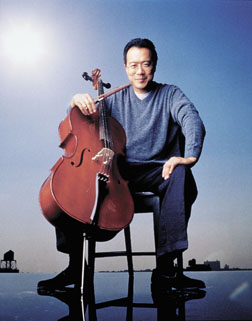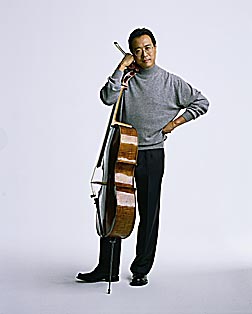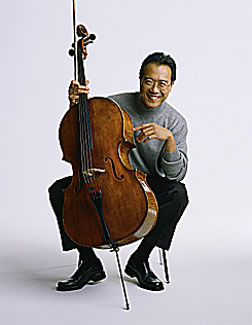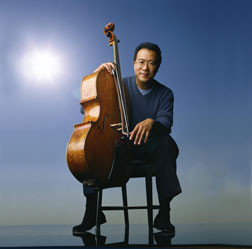Yo-Yo Ma - An Invitation to Explore by Lucie Renaud
/ December 1, 2002
Version française...
"We shall not cease from exploration
And the end of all our
exploring
Will be to arrive where we started
And know the place for the first time."
- Little Gidding , T.S. Eliot
No one who has met renowned cellist Yo-Yo Ma will be surprised to find these
lines from T.S. Eliot's poem at the end of his remarks on the summer program of
the Silk Road Project, for which he is artistic director. The poem is taken from
Four Quartets,
considered by a number of critics as the most important philosophical poetic
cycle of the twentieth century.
 There are distinct similarities
between these two artists. Thomas Stearns Eliot, perhaps like Yo-Yo Ma, was full
of contradictions. Eliot, who was born in St. Louis, settled in England and
became a British citizen. Yo-Yo Ma, the son of Chinese parents, was born in
Paris on October 7, 1955. He soon immigrated to the United States and spent most
of his youth in New York. He now lives with his wife and two children near
Boston. There are distinct similarities
between these two artists. Thomas Stearns Eliot, perhaps like Yo-Yo Ma, was full
of contradictions. Eliot, who was born in St. Louis, settled in England and
became a British citizen. Yo-Yo Ma, the son of Chinese parents, was born in
Paris on October 7, 1955. He soon immigrated to the United States and spent most
of his youth in New York. He now lives with his wife and two children near
Boston.
Even though Eliot had always wanted to be a poet, he studied philosophy at
Harvard, those hallowed halls where Yo-Yo Ma graduated with a liberal arts
degree in 1976 (and where he received an honorary doctorate of music in 1991).
Eliot was among the greatest intellectuals of his era, but in his spare time
loved to read detective novels and write limericks inspired by his cats. Yo-Yo
Ma has never hesitated to navigate the troubled waters of a multiplicity of
musical genres, recording with equal ease Bach's legendary Suites for solo
cello,
Argentinean tangos, folk music of the American West, or film sound tracks. At
the moment he is fascinated by Brazilian rhythms, which he discovered through a
percussionist with the Silk Road Ensemble--despite the fact that this group's
avowed goal is to perform music found along this legendary Eurasian corridor of
commercial and cultural exchange.
Yo-Yo Ma is always relaxed,
whether on the great classical concert stages or in the small classrooms of an
elementary school. He rises above technical difficulties and logistical
obstacles, stubbornly refusing to accept the status quo. "What I like about the
Silk Road Project is its non-static aspect," he says in response to a question
about the ground covered by the project since its inception in June1998. "If I
had to describe it in two words, I would choose 'creativity' and 'learning,' two
things that are never static." These two words seem to have been a leitmotif of
his work from the beginning. They depict him perfectly, despite his musical
superstar status in all genres.
"The best journey is the one not
yet accomplished."
- Loīck Perron

The creative phase of the
monumental Silk Road Project began four years ago when an exchange group was
formed, made up of musicians and composers from Asia, Europe, and North America.
Yo-Yo Ma remains the core of this group. "For me, the most exciting part of a
project is the research and development phase--the mental energy generated and
the pleasure of discovery when research enables you to realize the original
concept. You think about the concept, considering various ways of giving it
shape, but nothing is yet definite, you can float freely, dream. I call it my
'smog' phase." Yegor Dyachkov agrees. He is the young cellist working with the
project (although not with these sections of the tour). "He likes to juggle with
a number of ideas and work them out as far as they'll go."
The project has an advisory group
made up of ethno-musicologists, musicians, composers, and members of various
collaborating organizations. In July 1999 this group looked at the work of some
forty composers, subsequently commissioning compositions by sixteen of them.
These were all performed in workshops given at Tanglewood in July 2000. Ma
invited Yegor Dyachkov to take part in this musical laboratory. Dyachkov
remembers it as an extremely positive experience "that opened my mind to other
realities." What really bowled him over, however, was Ma's great openness of
spirit. "Everyone could go up and talk to him," he says. "I was very surprised
to discover someone so open to what was happening around him. He always listens
to you and never puts up barriers."
"Travel teaches tolerance"
- Benjamin
Disraeli
Several of the commissioned works
were chosen for the Silk Road Ensemble tour--but not before Yo-Yo Ma had met
various experts who provided background on the many special features of the
music and instruments of different countries. "No one person is an expert in
everything. You have to widen your basic knowledge in order to make a fairly
reasonable decision," he says by way of justification. Contributors to this
apprenticeship included university specialists such as musicologist and project
director Theodore Levin, as well as the musicians of the ensemble. "We have
exceptionally gifted musicians who are experts in their field but who are also
very open and ready to learn from others," Ma explains. They bond in the course
of rehearsals, concerts, and time spent in buses or airplanes. "It's a
tightly-knit group. We've developed a way of working and thinking that seems
right for everybody. We're constantly evolving. As we get to know one another
better, develop greater confidence in each other, and a better understanding of
our different traditions, we inevitably establish deeper personal and musical
relationships. This takes us to new heights and gives us greater
knowledge."
These closely woven relationships
give Ma an insight into the realities of daily life for people in other lands.
He says that now when he reads newspaper accounts of hard Mongolian winters that
threaten the inhabitants' lives, he doesn't turn the page to get to the arts
section quickly. Rather, he remembers his discussions with Mongolian singer
Ganbaatar Khongorzul. "It puts a human face to places that are far away," says
Ma. "We've got to learn about our neighbours. Too many people make monolithic
statements."
Byambasuren Sharav, composer of Legend of Herlen, a lively blend of traditional vocal
techniques and contemporary sound, says, "The Silk Road Project has helped me
gain a new sense of belonging to a place--my place --while carrying my musical
voice to a distant culture." Yo-Yo Ma adds; "Music is the best way humans have
of codifying the internal. We live in a time in which we try to codify
everything external. Music allows us to bring together people who are no longer
with us, or who live far away, and to find the essence of their being by
unravelling the musical process."
"What I like about travelling is the
surprise of coming home."
- Stendhal
 This instinct for clearing virgin territory is something Ma is very keen to
transmit to the younger generation. A great deal of preparation has gone into a
free online guide for teachers who want to follow the Silk Road with their
elementary or high school students. Geography, history, poetry, music, and the
various arts are there, complementing each other and providing an exciting
portrait of what life is like in other countries. "There's nothing more
important than getting young people enthusiastic through a cultural work
connected with our world," says Ma, himself enthusiastic as he talks. It's easy
to imagine him on his travels, sitting in the middle of a group of young
children and, in a pleasant and simple way, telling them about his life as a
musician. He also gives sound advice during masterclasses in both top-ranking
conservatories and lesser-known schools. Each summer, he spends time at
Tanglewood communicating his enthusiasm to young professionals. He doesn't
hesitate to appear in shows for youngsters such as Sesame Street or to act as a guinea pig for Wynton
Marsalis on the latter's PBS music series. This instinct for clearing virgin territory is something Ma is very keen to
transmit to the younger generation. A great deal of preparation has gone into a
free online guide for teachers who want to follow the Silk Road with their
elementary or high school students. Geography, history, poetry, music, and the
various arts are there, complementing each other and providing an exciting
portrait of what life is like in other countries. "There's nothing more
important than getting young people enthusiastic through a cultural work
connected with our world," says Ma, himself enthusiastic as he talks. It's easy
to imagine him on his travels, sitting in the middle of a group of young
children and, in a pleasant and simple way, telling them about his life as a
musician. He also gives sound advice during masterclasses in both top-ranking
conservatories and lesser-known schools. Each summer, he spends time at
Tanglewood communicating his enthusiasm to young professionals. He doesn't
hesitate to appear in shows for youngsters such as Sesame Street or to act as a guinea pig for Wynton
Marsalis on the latter's PBS music series.
Yo-Yo Ma laughs as he recalls his own youth, although it was somewhat
atypical. "I thought I was indestructible!" he says. This from the man who
discovered the cello at the age of four, after a hesitant start on the violin
(he wanted a bigger instrument!). As his first piece, he set to work on Bach's
Suites for solo cello, bar by bar, under the patient supervision of his musicologist father
and his mezzo-soprano mother. "He has enormous gifts and true inspiration," says
Yegor Dyachkov. Ma's incredible agility and exceptional ability to relax in his
mastery of the cello have earned him the keys to the world's cities. He gave his
first recital at the age of five, moved to New York to study with Leonard Rose
at the Juilliard School of Music at nine (the same year as his first recital in
Carnegie Hall!), won first prize at the Avery Fisher Competition in 1978, and
has performed with the greatest orchestras, worked with the best chamber groups,
and made numerous prize-winning recordings. Yet Ma says today that the years
spent at Harvard, far more than those at Juilliard, were what shaped his
personality. The enthusiasm of the other students, delighted to discover unknown
new worlds, contributed far more to his development. "I think the most
incredible thing in the teenage years is that you're always discovering music
for the first time. Everything is so exciting, everything is taken to the max,
when you're feeling good. When things aren't going so well, then you're really
down. To be able to navigate through all the excitement of discovery, to focus
your extraordinary passions on actions that will last a lifetime--this is the
greatest challenge of all. It's as though you were building your own cultural
structure, choosing the best bricks, and being able to change and adapt it
throughout life."
"The traveller must knock at all
doors before finding his own." 
- Rabindranāth
Tagore
Yo-Yo Ma is aware of the
depressing statistics of the greying and shrinking number of classical music
lovers, and worries about the number of orchestras obliged to seek bankruptcy
protection. But even so, he maintains that the cultural machine must be
integrated into economic and political spheres. "I keep discovering pockets of
people that get involved in fantastic ways," he says with satisfaction. "If
reality changes, isn't it a perfect occasion for rethinking the situation and
providing renewed energy? We have so many examples of traditions that are
continually being revived; I can't help thinking that we have a perfect
opportunity for change. We have contradictory definitions of classical music.
Nobody knows what it is--or at least everyone has a different view of
it."
Rather than harping on the
differences among various types of music, Yo-Yo Ma believes that we would all
benefit by finding a common ground, a single currency that would unify the
different factions.
"I believe the question should really be, 'What are the components of one
type of
classical music?'--because there are so many types. Is it only the music of
dead, white, European, male composers?" he asks, bursting into laughter. "In
that case, classical music is dead! But this isn't the case. We have to find out
where the new shoots are coming from, who are the people with interesting ideas
and who are discovering new things. If you look at the subject like this, you'll
find incredible growth everywhere. It's up to you to sow the seed, to nurture
the new shoots so they won't be destroyed, and to find out how to transmit this
knowledge to others."
"The true voyager is he who never
tries to turn back."
- Jacques Renaud
On the road to self-knowledge,
Yo-Yo Ma is always stopping here and there. "The most marvellous aspect of
travelling is the way people welcome you into their homes, and how they share
their stories, their most precious things with you. Sometimes the best way to
return the favour is to pass it on.
For Ma, the best way of handing
on this bit of life will always be through music, as long as his apparently
inexhaustible energy holds out. The Silk Road Project will probably continue
with members of "the next cultural generation," as Ma likes to call his young
colleagues. However, once he has travelled the road, he will no doubt plunge
unhesitatingly into another exploration, gradually convincing his admirers of
the worth of his destination. Happy the man who, like Yo-Yo Ma, continues to
have a good journey.
[Translated by Jane Brierley]
Yo-Yo Ma
and the Silk Road Ensemble will be in Toronto January 4, 5 and 7, 2003. On the
7th, he will be the guest soloist of the TSO. Info: (416) 872-4255 (January 4,5)
or (416) 598-3375 (January 7).
Version française... |
|


